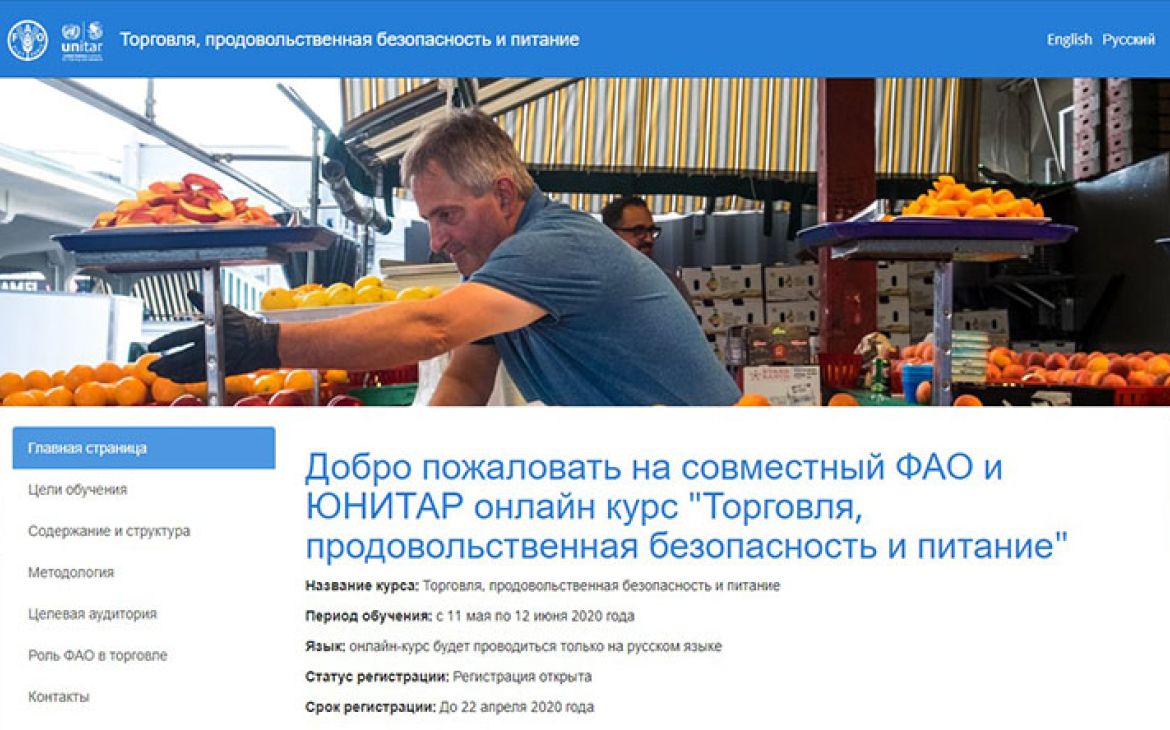3 March 2020, Geneva, Switzerland - UNITAR and the Food and Agriculture Organization of the United Nations (FAO) recently signed an agreement to re-run its joint online course on Trade, Food Security and Nutrition to be delivered in Russian language for officials across Europe and Central Asia. This is an updated version of the same course delivered in 2018 which generated a great interest across the region. The joint course in 2018 was able to accommodate only 25% of the applications received.
In the preparation of this course, FAO draws from its extensive experience with providing guidance, capacity building and technical advice to its Member Countries on the topics of trade and food security, agricultural trade policy and multilateral trade negotiations, as well as its normative work on sanitary and phytosanitary issues.
The course is designed to assist representatives from Ministries of Agriculture as well as other government ministries and officials directly involved in the formulation and implementation of trade, agricultural and food security policies and programs in the post-Soviet countries namely Armenia, Azerbaijan, Belarus, Kazakhstan, Kyrgyzstan, Georgia, Moldova, Russia, Tajikistan, Ukraine, Uzbekistan and Turkmenistan.
ROLE OF TRADE AND ITS IMPACT ON FOOD SYSTEMS IN THE REGION
In the post-Soviet countries, trade plays an important role in ensuring availability and variety of food and as a source of income from expanding exports. The region plays an increasingly important role as a supplier of agricultural commodities in the world markets. To facilitate participation in international trade, the majority of the post-Soviet countries have joined the World Trade Organization, and many countries actively participate in regional and bilateral trade agreements.
While agricultural trade contributes to the economic growth in the region, malnutrition continues to be present to varying degrees in all countries of the region, with relative weights gradually shifting from undernutrition to overnutrition. Dietary changes, as part of broader lifestyle changes, explain these trends. However, trade, with its impacts on food systems, also influences consumer choices and the ultimate composition of diets. In this context, changes in market structures, driven by the broader economic policies, including trade measures, can have important implications for food security and nutrition in terms of effects on prices, variety and quality of available food, as well as incomes.
REGISTER NOW, LIMITED SLOT ARE AVAILABLE
This course is offered free of charge as part of FAO’s support to Member countries from Europe and Central Asia and will be organized in four units and conducted in Russian language over a period of four weeks. This course will be delivered online via UNITAR’s e-learning platform and will take place from May 11 to June 12, 2020.
Limited slots are available and will be subject to a selection process conducted by FAO and UNITAR, taking into account in particular, the geographical distribution and gender balance. Priority will be given to policy makers and practitioners who develop agricultural and trade policy, as well as experts in the field of food security who are involved in the discussion and formulation of policies in this area.
A UNITAR-FAO Certificate of Completion will be issued to participants who successfully complete all course-related assignments and assessments.
For more information and online registration, please visit UNITAR’s website at: www.unitar.org/tfsn-ru. Registration deadline is April 22, 2020 or while slots are available. Please register early. Female candidates are strongly encouraged to apply.
About the FAO-UNITAR Partnership
Over the past six years, UNITAR's collaboration with FAO has continued to grow with over a dozen of agriculture and trade-related courses developed and delivered for the benefit of over 1,000 beneficiaries globally with a large part coming from Africa and Central Asia.
ABOUT FAO
FAO is a specialized agency of the United Nations that leads international efforts to defeat hunger. The goal is to achieve food security for all and make sure that people have regular access to enough high-quality food to lead active and healthy lives. With over 194-member states, FAO works in over 130 countries worldwide. For more information, visit www.fao.org.


